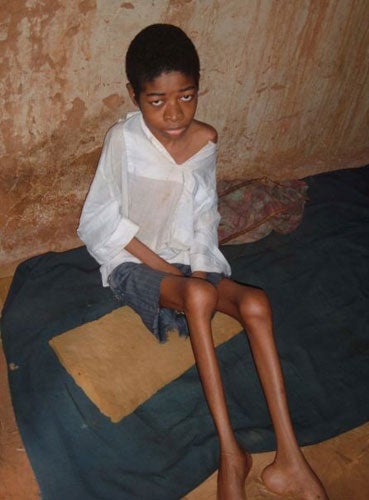Independent Appeal: 'Without them, I would have died and never seen the sun'
Innocent Sombie was shunned for his disability. Thanks to ADD, one of our Christmas charities, he is a pariah no more

Your support helps us to tell the story
From reproductive rights to climate change to Big Tech, The Independent is on the ground when the story is developing. Whether it's investigating the financials of Elon Musk's pro-Trump PAC or producing our latest documentary, 'The A Word', which shines a light on the American women fighting for reproductive rights, we know how important it is to parse out the facts from the messaging.
At such a critical moment in US history, we need reporters on the ground. Your donation allows us to keep sending journalists to speak to both sides of the story.
The Independent is trusted by Americans across the entire political spectrum. And unlike many other quality news outlets, we choose not to lock Americans out of our reporting and analysis with paywalls. We believe quality journalism should be available to everyone, paid for by those who can afford it.
Your support makes all the difference.His name, ironically, is Innocent. When he was just five he lost the use of his legs through polio. For the next 11 years he lived, hidden, in a dark hut in Burkina Faso in west Africa because his family felt disgraced by his existence. There, in the darkness, he languished under the sentence of his family's shame. The boy was weak and small for his age. His skin was pale and delicate. He was afraid of the outside world and recoiled from anyone he did not know. "When I heard footsteps I used to hide myself in a place where nobody could see," he says. "I was not authorised to leave the hut."
Then, after more than a decade, he was found by a self-help group of disabled people who were making a survey to find other disabled people. The group, Sakountan, is supported by Action on Development and Disability (ADD), one of the three charities being supported by The Independent's Christmas Appeal this year.
At first, Innocent's uncle denied he existed, but neighbours kept insisting that a child lived there. After weeks of persistence, Sakountan persuaded the uncle to allow them to bring help.
The story of Innocent Sombie is, sadly, not unusual in Africa, nor in many other countries. He had been abandoned by his father after he became ill. In many parts of Africa, disability is seen as a curse which shows that the mother has sinned, or that the child did something terrible in a previous life. A total of 650 million people are disabled, about a tenth of the world's population. More than 80 per cent of them live in developing countries where they constitute as many as 20 per cent of the poorest people. What disables them most is not their physical impairment but the attitudes of others. "Parents were afraid to even show they had disabled children," says Helen Alupo, a beneficiary of one of ADD's programmes in Uganda where the charity has been supporting disabled people's organisations for more than two decades. "They would not even take a disabled baby to the hospital."
Even clothing a disabled child seemed a waste. Children could be tied to a pole in the home, and be left to urinate and defecate there. "If a party was planned at home, parents would hide their disabled child inside a granary bin," says Helen, whose daughter, Lucy, is epileptic. "And what was the point of taking a child to school if they were never going to find a job?"
Things have changed because social attitudes there have changed, thanks to ADD. But there is much more to do. Still, 98 per cent of disabled children in developing countries do not attend school. This, in its turn, contributes to high unemployment figures among adults with disabilities. It is a vicious circle ADD is striving to break. So is another of The Independent's Christmas charities, One World Action. It understands that action at an even deeper level is sometimes necessary to bring change. One of its partners in Cambodia offers the example of a man who had both legs amputated and was cruelly nicknamed the Frog.
A charity gave him metal legs, but he was still scorned by the village. Another charity trained him to mend bicycles; he set up a business, but few came to him. Then a third charity gave him access to information about his rights. It also brought him the knowledge and confidence to challenge his community. Today he is one of the most prominent community leaders in his village. He is an outcast no more.
Neither is Innocent Sombie. He has joined the Sakountan Association that ADD funds. With the support of its members, he is learning the skills he needs to live with other people and to make friends. "I feel better," he says. "I know other people who do not see my disability."
When the association gave Innocent a wheelchair he smiled for the first time since being found. "I am so happy to be able to move," he says. He now has a job, selling sweets and biscuits from the front door of his home. Sakountan is trying to raise the money to get a tricycle to give Innocent even greater independence. "I cannot thank the association enough," he said. Without their actions, I would have died without having seen the sun."
Join our commenting forum
Join thought-provoking conversations, follow other Independent readers and see their replies
Comments